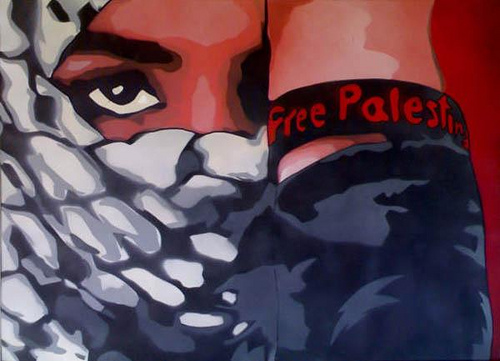I had the pleasure of translating an important post (Hebrew) by the always-excellent Shalom Boguslavsky. Here it is in English:
Should you strengthen the van, you will weaken the rear.
Should you strengthen your right, you will weaken your left.
If you send reinforcements everywhere, you will be weak everywhere.
Sun Tzu,
“The Art of War”, ca. 500 BC
Fifteen years ago I didn’t know what “Nakba” means. I was probably more politically involved than today, I had already entered into dialog with Palestinians, I was familiar with the Palestinian National Covenant and all that stuff. I wasn’t exactly an ignoramus in these things, but I didn’t know the term “Nakba”, for the simple reason that nobody around me was using it.
Now it’s hard to find anyone who doesn’t know the term. It’s in every mouth and in the headlines of every paper. Netanyahu gives a special speech in its honor, “Im Tirtzu” distribute a brochure full of bullshit about it, and the very best publicists write articles about it. It doesn’t matter that most Israelis’ response varies between curling up in a whimpering ball in the corner and vehement denial. The central thing is that the issue is on the table. Because political success is measured in what’s being talked about even more than in what’s being said. Almost nobody in the Jewish political system wants to talk about the Nakba. They would not have brought it up on their own initiative, and nonetheless they have been forced to deal with it.
The credit for this success belongs mainly to Palestinian citizens of Israel. The Oslo two-nation-states doctrine left them as dead weight, and so, unrepresented by the government of the Jewish state and neglected by their Palestinian brethren, they started moving to turn the Arabs of 1948 into a political group demanding recognition as such, from the Palestinians, from Israel and from the international community.
Here there is an interesting parallelism between them and the settlers. The settlers, too, have been required to pay the price for a solution that does not address their needs. The settlers, too, have been pushed to reorganize and make themselves present in the public discourse, and they too have used 1984 to do this, and for a similar reason: floating the issue of ’48, reminding everyone that the heart of the conflict lies there, is the best way to float the limitations of a solution based on the 1967 lines. So the settlers, like the leaders of the Arabs of ’48, make sure again and again to remind us that Sheikh Munis is conquered land, and that a solution will not come without seriously addressing this fact. In this respect, the the most radical thing in today’s politics would be if the settlers and the Arabs of ’48 started to talk. Unlikely? Maybe, but stranger things have happened and I wouldn’t be surprised if this happened too.
In 1923, Ze’ev Jabotinsky wrote his exemplary essay “The Iron Wall”. Besides being a master’s class in political writing, the article was quite on target for its time, and to a significant degree for ours as well. Jabotinsky presents the Zionist movement as a colonial project no different from the familiar European colonialism (today some would call him “traitor” and “anti-Zionist” and demand to check his funding over this). He argues that the attempts at dialog with the Arabs are fantasy, as no nation – and he recognizes them as such – would agree to a foreign entity being established on its lands, and his conclusion, which he called an “iron wall”, is that the Jews must become such a force as to make it impossible to move them elsewhere or hinder them from realizing their aspirations. But the “iron wall” has an expiration date: when they realize the Zionist project is a fait accompli, Jabotinsky wrote, the moderates will come to us with offers of mutual concessions, and then the conflict can be solved in dialog.
In 1923, all of this was science fiction. But as befits a text that reflects sober recognition of reality more than some political ideal or another, we got to see it come true. The “iron wall” was put up, the Arabs failed in their attempt to hinder the Zionist project, suffering catastrophe in the process, and since the 1970s the moderates have been coming to us with offers of mutual concessions. They don’t do it out of recognition of the rightness of the ways of Zionism – this they will never do – but because it is clear to them that the presence here of Jews as a national group is a fait accompli. They regret it, but will clench their teeth and find ways to co-exist. Just as Jabotinsky knew they would.
But his self-proclaimed heirs on the Israeli right have substituted the practical “iron wall” of force with an ideological “iron wall” made of fear.
My right to exist here comes from the fact of my existence here, as ending it would be an unjustifiable wrong. The right of the group to which I belong to define itself in terms of nationality comes from the right to self-definition and not from anything else. Where is such a thing to be heard, that such basic rights depend on some belief in the “righteousness of the way”? Who would ever think, for example, to make the right of the United States to exist dependent on the belief that the catastrophe imposed on Native Americans was justified? What’s this bullshit?
The international community recognizes the rights of Jews in the Land of Israel due to the fact of their presence in it. Even the Arabs, for the most part, are willing to recognize them on this basis, and of all people the Jewish politicians, wannabe patriots that they are, are shouting from every hilltop and under every tree that if it were only proven that our history does not excel in justice and morality or that our narrative is not absolute truth, we would have to pack the suitcase and swim back to the Ukraine. And you know what? Our history is no less ugly than others, and full of glorious atrocities. Those who believe recognizing that cancels their right to exist here are welcome swim to the Ukraine themselves. I am not here because of blind faith in some lie, and I intend to stay here even if it were proven that the fathers of Zionism were vampires from another planet that came here to conduct medical experiments on the local villagers.
So this is my “iron wall”: the rights of human beings do not depend on the purity of the historical circumstances that brought them where they are. This is a position we can defend. If we need to defend every misdeed of Zionism if not all Jews everywhere – as the Right wants us to – we will fail. And that is exactly what is happening now.
I am actually rather conservative as regards the Palestinian catastrophe. I do not accept, for instance, the claim that the status of refugee can be inherited. If it were so, all residents of planet Earth would have to receive such status. I also think it’s important to remind everyone that the ethnic cleansing of 1948 was bi-directional: the Jews were expelled from areas seized by the Arabs. I think the ethnic cleansing we committed was more a matter of circumstances than a dark conspiracy, and I certainly don’t beat myself up over the crimes of Zionism.
But I certainly admit and acknowledge them, do not presume to justify them all and certainly think we should take responsibility for them and resolve the matter in conjunction with the Palestinians. Not because there’s a matter of absolute justice here but because this is unfinished business between us, and we will have to resolve it. And yes, this will have a price that I don’t necessarily like. That’s how it is.
But for us to deal with it, we need our politicians to cease their endless paranoid prattle. It may help their career to tie our very right to exist here with their personal ideology, but it does not serve any Israeli interest. Just the opposite. Their constant din is what’s eroding the justification of our existence and what gives tailwind to the delegitimization of Israel. Of course it also serves their career pretty well. Dealing with the Nakba does not scare me at all; our politicians’ stupidity does. They are the only existential threat around.






